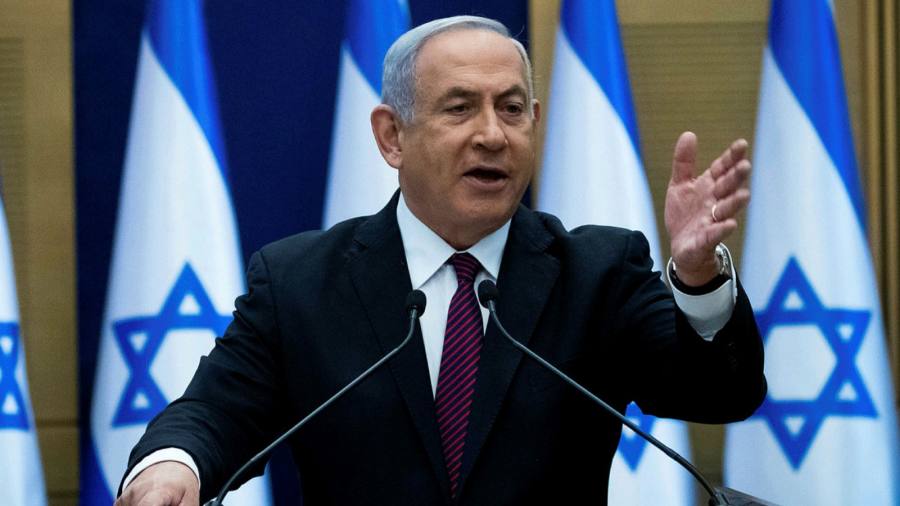[ad_1]
Israel will wield some of its excess supply of coronavirus vaccines as international humanitarian aid, using its glut of jabs to pursue diplomatic goals while Palestinians wait for aid shipments for their own supplies.
The first three countries to receive thousands of doses will be Honduras, the Czech Republic and Guatemala, all of whom recently agreed to strengthen their diplomatic presence in Jerusalem, bolstering Israel’s claim to the contested city.
The news was first reported by the Kan public broadcaster and a senior Israel politician later confirmed the plans to the Financial Times. “It’s happening,†he said. The Czech Republic said it had received a small Israeli shipment, Reuters reported, and the government of Honduras has said it is expecting 5,000 doses from Israel. Flight trackers showed a Honduran military jet landing on Tuesday at Israel’s closed Ben Gurion airport.
The Israeli government has yet to officially confirm the deliveries, though in a statement on Tuesday it said: “In light of the successful vaccination campaign in Israel, the leading country in the world in inoculating the population, Israel has received many requests from the countries of the world to assist with the supply of vaccines.â€
The decision to use Israel’s leftover doses of the Moderna vaccine comes after the Jewish state struck a data-sharing deal with Pfizer that resulted in unrestricted supplies, fuelling the world’s fastest vaccination campaign.
The policy could also be extended to help speed up talks with Muslim majority states considering warming their diplomatic ties with Israel, another Israeli official said.
Benjamin Netanyahu, Israel’s prime minister, has already had success with the new policy. Over the weekend, an Israeli woman who had crossed over into Syria was released after Israel paid Russia to fly an unspecified amount of its Sputnik V vaccine to the Syrian regime, the senior Israeli politician said.
Israel is in the enviable position of having access to unused vaccine, especially as back-up deals with Moderna and AstraZeneca mean that millions of vaccine doses are either on the way or already in cold storage in the Jewish state.
But it has rejected any suggestions that it is obliged under international law to provide vaccines for the Palestinians that live under its occupation, saying the 1993 Oslo Accords, which provided for limited self-rule in heavily populated areas in the West Bank and the Gaza Strip, transferred that responsibility to the Palestinian Authority.
It has sent fewer than 5,000 doses to the Palestinian Authority to inoculate front-line healthcare workers, and a smaller, unspecified number to the Gaza Strip, according to a defence ministry official.
“Not only does Israel deny Palestinians access to vaccines, Israel is also doing this to extract political points at the expense of Palestinians †said Diana Buttu, an Arab-Israeli lawyer who has worked with the Palestinian Authority in its negotiations with Israel. “This isn’t just that there’s a convenient trade arrangement between Israel and the Honduras, it is because Honduras is moving their embassy to Jerusalem and that’s why they are getting the vaccine.â€
Separately, Netanyahu decided against delaying the transfer of international aid shipments of the vaccines to the Gaza Strip to pressure Hamas to release the bodies of two Israeli soldiers and two civilians held by the militant group.
The Israeli military advised against using access to vaccines as leverage after ministers in Netanyahu’s rightwing camp publicly demanded that access to vaccines be conditional on the release of the bodies and prisoners.
Defence minister Benny Gantz responded to news reports of deliveries to other countries by saying it was a “trade in vaccines paid for by Israeli taxpayersâ€, and Netanyahu had made the decision without consulting the rest of the government.
The talks to release the Israeli woman, mediated by Russian president Vladimir Putin, also included the return of two Syrian shepherds who had crossed into Israel, and were made easier after Syrian authorities were provided an assurance that the woman was neither a spy nor a threat.
Netanyahu later ducked journalists’ questions on whether vaccines were used to speed up her release, saying only that no “Israeli†vaccines had been traded.
[ad_2]
Source link





